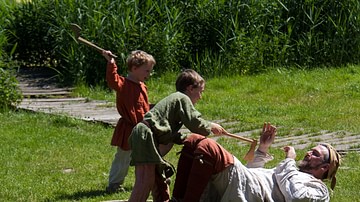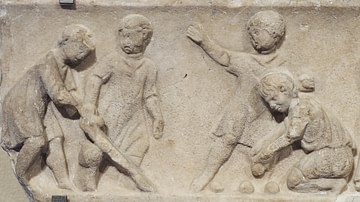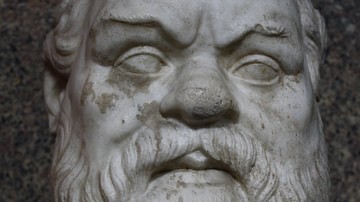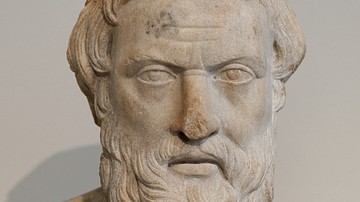Search
Search Results

Definition
Ancient Celtic Religion
The polytheistic religion of the ancient Celts in Iron Age Europe remains obscure for lack of written records, but archaeology and accounts by classical authors help us to piece together a number of the key gods, sacred sites, and cult practices...

Article
Childhood in the Viking Age
Childhood in the Viking Age (c. 750-1100) was largely undocumented as historical records primarily focus on adults, particularly men. Likewise, little is known about children's presence in the afterlife, as no runestones were raised in their...

Article
Legacy of the Ancient Romans
The legacy of the ancient Romans – from both the time of the Roman Republic (509-27 BCE) and the time of the Roman Empire (27 BCE - 476 CE) – exerted a significant influence on succeeding cultures and is still felt around the world in the...

Article
The Family in Ancient Mesopotamia
Family in ancient Mesopotamia was considered the essential unit that provided social stability in the present, maintained traditions of the past, and ensured the continuance of those traditions, customs, and stability for the future. The...

Article
Childhood in Ancient Rome
Freeborn Roman children, ingenuiae, born of Roman citizen parents lived a life that was dictated by the level of society into which they were born; a day in the life of a child from the lower level of society and one from the more affluent...

Definition
Athens
Athens, Greece, with its famous Acropolis, has come to symbolize the whole of the country in the popular imagination, and not without cause. It not only has its iconic ruins and the famous port of Piraeus but, thanks to ancient writers, its...

Definition
Socrates
Socrates of Athens (l. c. 470/469-399 BCE) is among the most famous figures in world history for his contributions to the development of ancient Greek philosophy which provided the foundation for all of Western Philosophy. He is, in fact...

Video
The Role of Dance in Ancient Greece
There were many occasions in ancient Greece where people danced, especially since rhythmic physical exercise and pall playing were also considered dance. The ancient Greeks would dance at weddings, symposiums (which were all male drinking...

Definition
Herodotus
Herodotus (l. c. 484 – 425/413 BCE) was a Greek historian famous for his work Histories. He was called The Father of History by the Roman writer Cicero, who admired him, but has also been rejected as The Father of Lies by critics, ancient...

Definition
Chariot
The chariot was a light vehicle, usually on two wheels, drawn by one or more horses, often carrying two standing persons, a driver and a fighter using bow-and-arrow or javelins. The chariot was the supreme military weapon in Eurasia roughly...